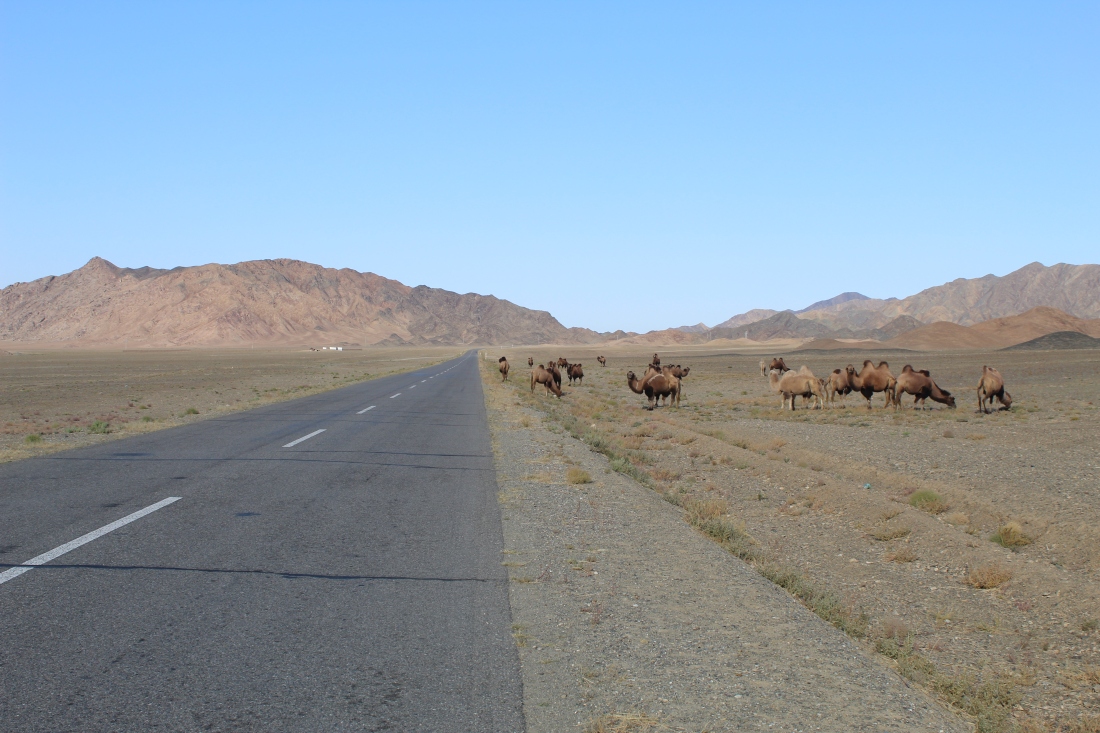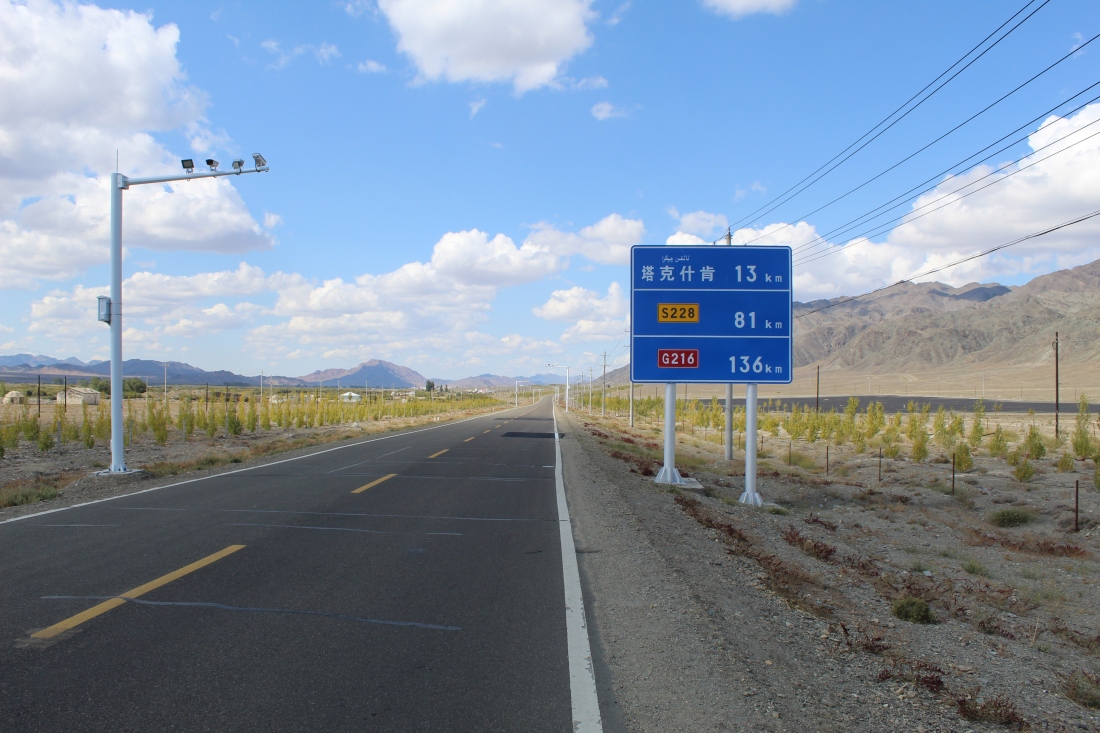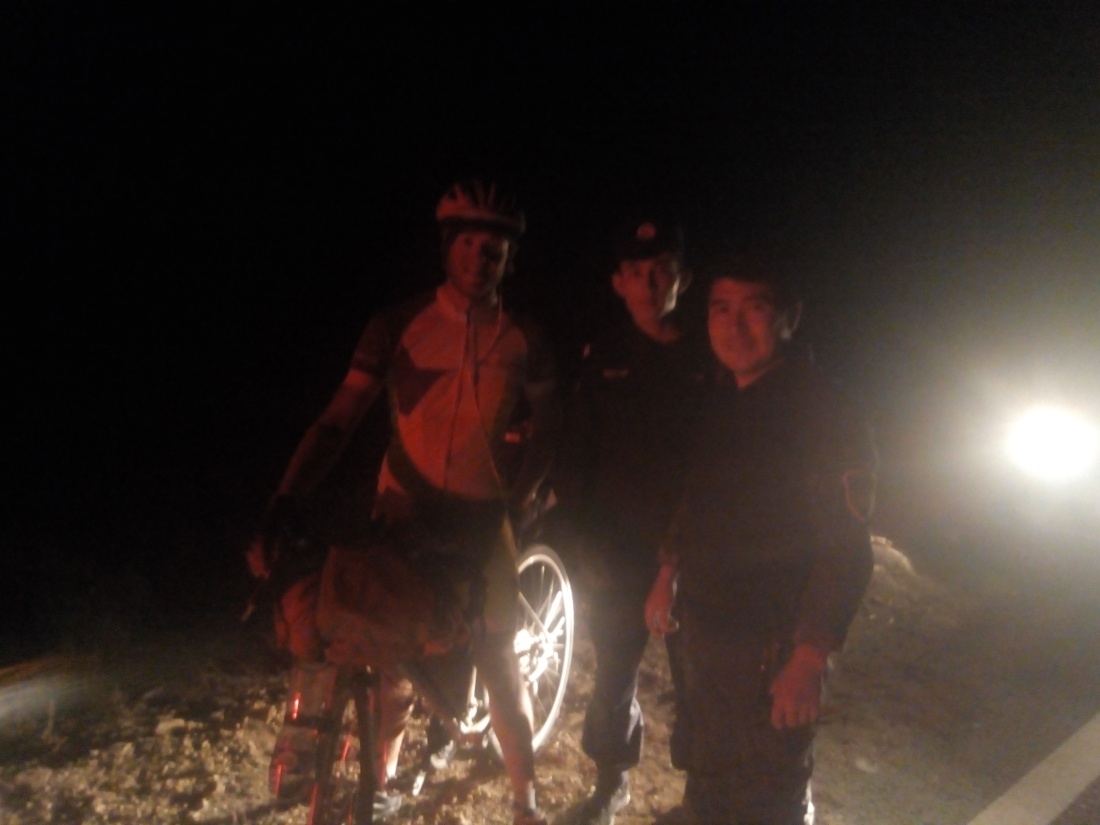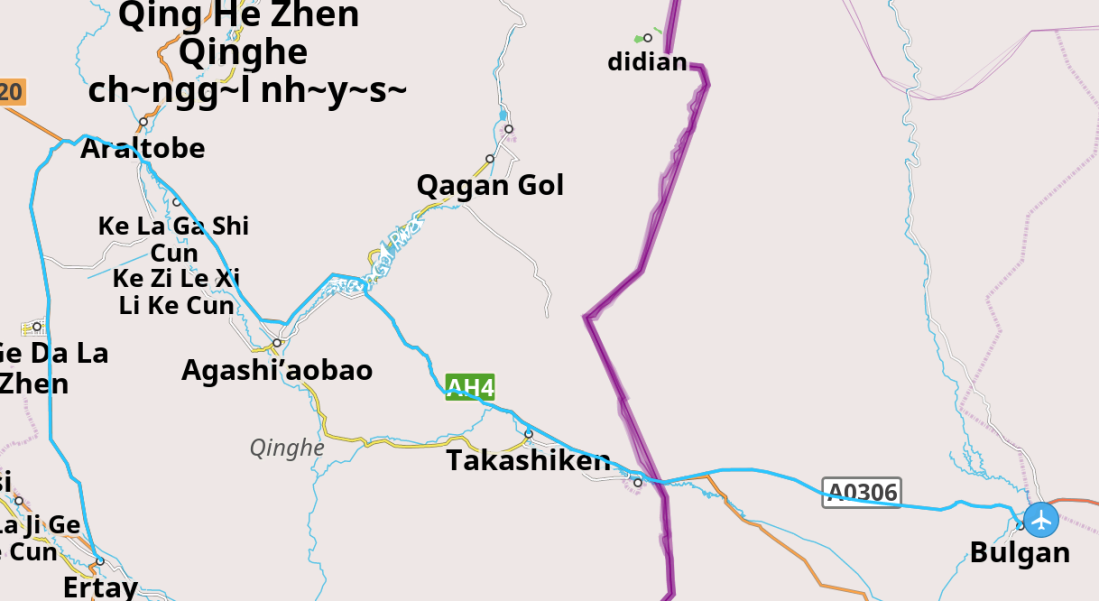The eighteenth of September was a day that started simply enough. I set off from Bulgan, heading in the direction of China. The landscape was barren; the only animals I saw were camels.

After riding for a couple of hours, I reached the border. There was a bank there where I tried to exchange my remaining Mongolian Tugrik for Chinese Yuan. However I only had about £10 worth of Tugrik, and the smallest notes the bank had were 100 yuan (about £11). The woman working at the bank led me over to a nearby shop and restaurant and negotiated on my behalf for me to exchange most of my money there. I thanked her and made my way to the border checkpoint.
Apart from me, everyone crossing the border was doing so by truck, through a separate crossing. A border guard opened up the gate for me and sent me to Mongolian customs, a big building with about ten people working there. I was the only non-employee though so I was quite quickly stamped out of Mongolia and headed towards the Chinese part of the crossing.
The region of China I was entering is called Xinjiang. It is home to an ethnic group called the Uighurs, and there are tensions between the Han Chinese and the Uighurs. Security here is always tight, and with the Chinese Communist Party planning a big anniversary celebration it would be even tighter. I knew this going in, and decided to just consider it all part of the experience. This is not an option for the locals, of course. Estimates vary for the number who have been forcibly concentrated in “re-education” camps, ranging from hundreds of thousands to millions. The remainder live under constant surveillance in a police state.
My passport was checked by the first guard on the Chinese side. I waited as he radioed ahead, then was directed to the first building. A guy there checked my passport, then asked me to remove my bags from the bike and bring them inside. In the building, another guy checked my passport again.
They asked for my camera, phone and tablet. One guy went through the photos on my camera and phone while the other checked the tablet. I don’t have many photos on the tablet but one of them was a selfie from when it was very cold. My face was fully covered by two buffs, effectively a balaclava. I realised this wasn’t the best look and pointed at it, saying cold and shivering. The guy smiled and nodded. Throughout the process everyone was very polite and smiley.
Once they were satisfied with the photos it was time for the body scanner. In I went, arms up, turn around, and out again. Then the bags went through an x-ray scanner, and I was asked to open the handlebar roll. I identified all the items and then closed it back up again.
Outside the building, a man checked my passport then led me to the next, larger, building, where another man checked my passport before showing me inside (with the bike). I handed over my passport at the immigration desk and three people examined it closely, paying special attention to the holograms. Once they were satisfied, they had me fill in an immigration card and look into a camera. They took my fingerprints, stamped my passport, then waved me on.
A woman asked for my passport, then showed me to an x-ray machine. Bags were scanned again, and the handlebar accessory bag checked and camera photos examined. This time they had a quick look inside the frame bag and top tube bag, which stayed on the bike throughout. Finally she said I could go, and apologized for the inconvenience.
The people at the border had all been friendly. They’d asked me questions about my trip, in a way that seemed like friendly curiosity but may have been part of their job. Seeing the state of my front tyre, one of them told me there would be a bike shop in Takashiken, the first town.
At last I left the border and set off cycling into China. Signs are now in two languages: Arabic and Chinese. These are both entirely unintelligible to me!

After about fifteen kilometres I reached a queue of trucks near a petrol station. From a distance it looked like any petrol station forecourt you’d see in Britain. Then I saw the concrete wall topped with razor wire. The gates were manned by armoured police, who searched people and let them in one at a time. That was different.
I went into the town and, by pointing at the bike, got directions to the bike shops. They were in the bazaar, a much more organised affair than usual. Shops surrounded a large, mostly empty central square. There was one entrance to the square, with barriers. Locals had to present ID and be scanned before entry, but I was allowed through.
At the third bike shop I tried, I found a 700c tyre – the others only had 26inch ones. A slight drawback was that it had a width of only 23mm. My tyres, with a width of 35mm, are already considered extremely narrow for touring. Still, at a cost of 45 yuan (£5) and coming from that most reputable brand, the Hang Zhou Rubber Factory, I only wanted it to last me until the next city. Until then I’d be on tarmac so a narrow tyre was fine.
As I left the shop, two men approached me. One was in police uniform and the other, clearly in charge, had no uniform. He had photos of my passport on his phone, and asked for my passport so that he could compare them. Once satisfied, they left.
I made it about fifty metres out of the market before being stopped by a police car. They were busy detaining some Uighurs but took the time to ask for my passport, then told me to follow me to the police station. I hung around there for some time as they registered me, then was allowed to go.
This time I made it about two kilometres unaccosted. There was a checkpoint on the outskirts of town. Locals had to scan their ID cards and go through a body scanner before being allowed to go through. It took some time for them to figure out what to do with me. The passport couldn’t be scanned in the same way as ID cards so I had to sit around while they sorted things out. While they were discussing it, a non-uniformed man showed up and seemed to get involved. After taking down my details they handed the passport to Mr Plainclothes, who led me outside and gave me the passport back – which I think he came to regret.
I went and got my bike, and he went to his car. He pointed at the bike, then at his car. He clearly wanted me to get in the vehicle. I shook my head, and pointed at the bike. He shook his head, and pointed at the car. I pointed at the bike. He pointed at the car. This went on for a little while.
Eventually I pointed at the bike, and he did nothing. Satisfied, I got on the bike and rode away. He got in his car and followed.As escorts go, he was actually very unobtrusive. He stayed a reasonable distance behind – I wouldn’t have known he was there if I didn’t look around occasionally. In fact I didn’t even notice when he was replaced. After an hour and a half I stopped to pee, and realised that I was now being followed by two guys in a police car. Mr. Plainclothes hadn’t even said goodbye.
The next changing of the guard was more obvious. An oncoming police car did a U turn then stopped in front of me, with the occupants getting out and gesturing for me to stop. My passport was checked and the policemen spoke. I smiled and introduced myself to the new guys. My strategy to avoid being forced into a police car was to be as nice as possible to the police. I had two new escorts: Burgen, dressed in camo, and Changmin, in a police uniform. I think the guys in police uniform are Han Chinese, while the ones in camo are Uighur, but I’m not certain about that.
I was also avoiding stopping, in order to avoid giving the police any excuse to put me in a car. So I continued to ride, with my escort being replaced before long by two new cars.
The purpose of these guards was never made clear. Were they closer to bodyguards or prison guards, there to protect or to restrain me? From my perspective it was more the latter, but I think they did believe it was the former to at least some extent.
At sunset, one of the escort vehicles overtook me and gestured for me to stop in a village that my map transliterates as “Ke Yi Er Gen Cun.” With my two escort cars, the new car that was relieving them, and some local officers who’d wandered over, there were now about ten men in what I chose to think of as my Honour Guard.
One of them spoke some English so I made sure to be extra nice to him as he was effectively advocating for me to the others. They said there was a hotel and bank in 40 kilometres. At my insistence I was allowed to cycle, and off I rode into the darkness, with a police vehicle close behind.
Normally I prefer not to ride in the darkness, but having the flashing lights of a police vehicle behind me ensured that everyone was driving carefully. After about an hour and a half, they signalled me to stop for another guard change. The old and new guards took lots of photos (often selfies) and to my surprise allowed me to do the same.

The new guards suggested I get in the car, but I smiled and firmly pointed at the bike. They relented. They were all quite jolly; I think it was probably quite an interesting diversion from their usual duties.
A couple of kilometres before the town they signalled for me to stop again. There was no bank or hotel in this town. They said something about a “military hall,” twenty kilometres away. Again they suggested the car, while I stayed firm about cycling. It was a couple hours past sunset by now; they actually seemed very impressed by my insistence!
I ended up losing the guards for a little while. They stopped, I think in order to help a vehicle stopped by the road. I considered finding somewhere to camp, but was slightly concerned this could lead to a manhunt! They caught up after a few kilometres anyway.
About an hour past the town, I acquired new guards. Another passport check, another (declined) suggestion that I get in their vehicle. I was now told there was a hotel in 26 kilometres. By this point I had lowered the brightness of my light in order to conserve battery – I was beginning to think I might have to ride all night!
After about ten kilometres, though, we reached the town of Ertay. I asked the policemen if there was a hotel and bank here. They told me to follow them, and led me to a hotel. They said there was no bank, though, so there was still the problem that I hadn’t been allowed to withdraw money! In the end it was agreed that I could sleep in a spare bed in the administration office. The TV there was on and there was a twenty second English segment on Brexit! You can’t avoid it anywhere.
It had been quite a long day. It was about eleven hours since I last stopped to eat, though admittedly several hours of that was spent standing around while police decided what to do. Still, I’d ridden about 160 kilometres since that last food break, having eaten just 250g of chocolate while pedalling. Surprisingly I wasn’t actually feeling very hungry!
This was one of the more bizarre days of the tour – so far, anyway! It was the sort of situation that, if asked five years ago, I would never have imagined myself in.

September 18th: 194km.
Looking back on this experience, what would you have done differently to avoid all the police attention?
LikeLike
I never actually saw this comment; I’ve just noticed it now, sorry!
Honestly I don’t think there is much that could be done beyond not going to Xinjiang. That’s just the reality of the situation there.
Sam.
LikeLike